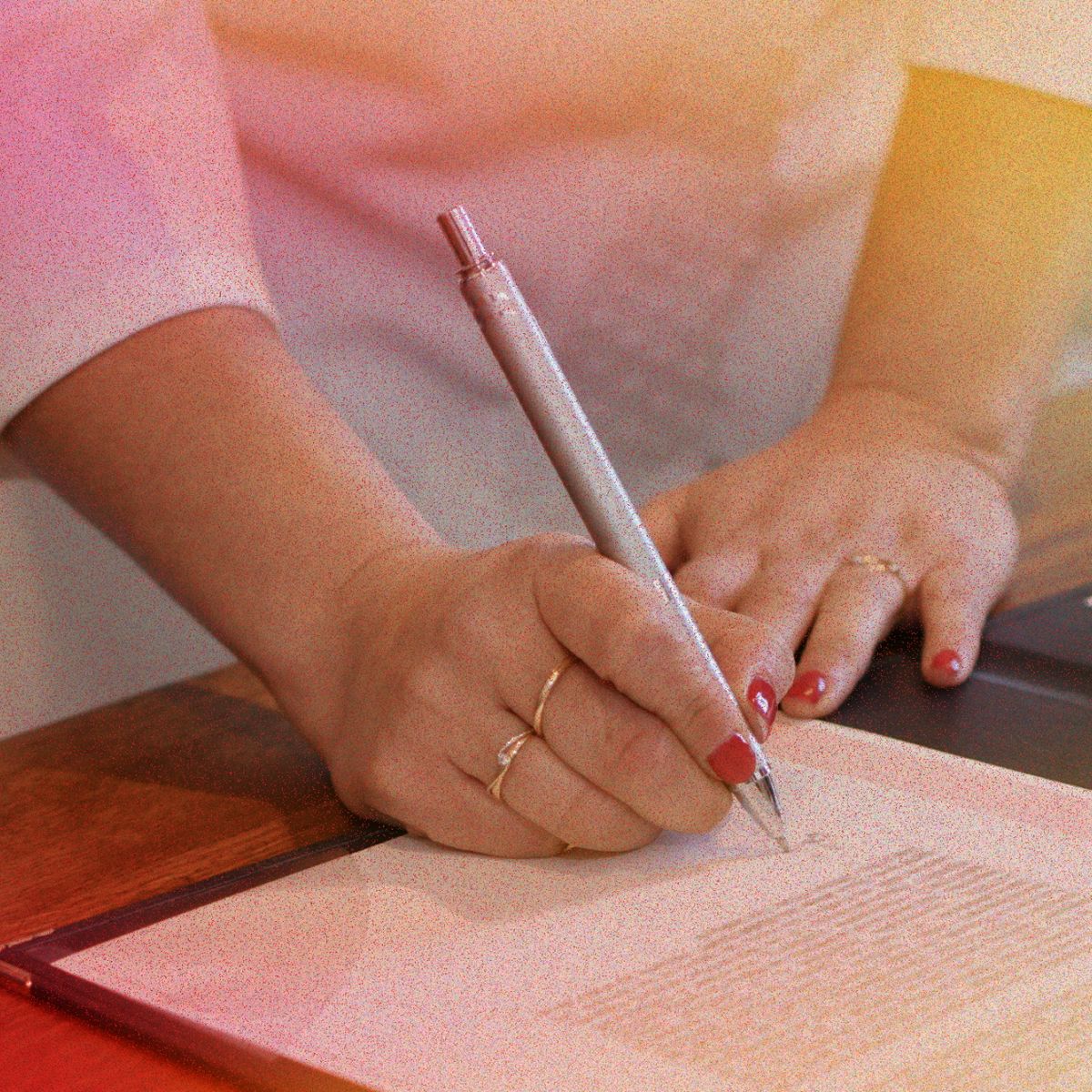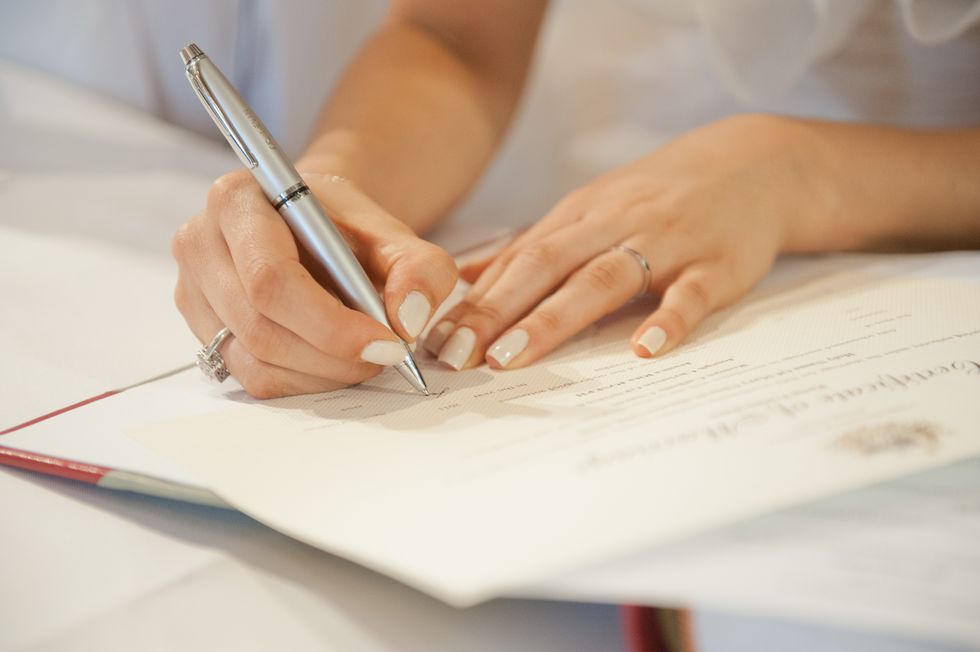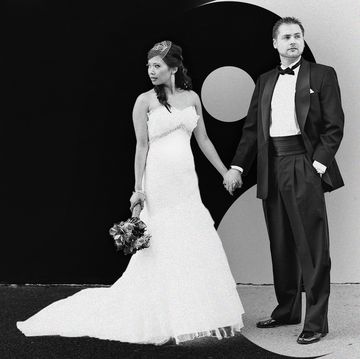Juliet once asked Romeo, “What’s in a name?” More than 400 years later, those getting married or otherwise solidifying partnerships are still asking themselves the same question. The context, however, is much different than what Shakespeare ever pondered. The debate over whether or not to take a spouse’s name — and accept everything that comes with that decision — continues to rattle individuals on the cusp of commitment.
The choice should not be an easy one, says psychotherapist Carlen Costa. “Your name is a symbol of your identity,” she explains, “and many people have crafted beautiful lives that they are proud of and feel safe with in association of their name. Feeling safe in our identity is about feeling like we are home to ourselves. That’s a huge factor in mental wellness maintenance.”
If you or someone you know is facing this decision, here is guidance from relationship experts and those who've asked themselves whether they should change, keep, or create an entirely new version of their last name.
Know your why
Whether you want to change your name à la Hailey Bieber or keep it like Iliza Shlesinger, think about the reasons why you would or wouldn’t want to take your partner’s last name. “The key for a bride is to not make a decision that will create resentment for her to live with in the long run,” says behavioral relationship expert Tracy Crossley. “She needs to look at her ‘why’ and ask herself, ‘Why is this important to me?’”
Lindsey Metselaar, host of the We Met at Acme podcast, kept her last name because of her career. “I haven’t changed it yet because I use my name for business,” she says. “I plan on legally changing my name but sticking with Lindsey Metselaar for business forever.” Metselaar notes that she was inspired by other women in her life who have a name that they started their career with and didn’t ultimately change it.
Jasmine Chalashtori, an associate attorney, kept her “why” top of mind as well when it came time to choose. “I’m proud to be a first-generation Iranian American,” she says. “My dad came to the U.S. by himself when he was just 16 and built himself into a successful businessman. It was important to me that my successes bear his family name in recognition of that background and his hard work.”
Chalashtori also liked that her maiden name was more unique and recognizable than her potential married name. She says that can be an important distinction in the legal industry, especially as a litigator who drafts and submits court filings nationwide. “By the time I got married,” she says. “I was already working toward building that name recognition.”
For many, children play a huge role in the decision-making process. “I changed my name because, while I am very independent, I also love the idea of creating a new family unit and having the tradition of sharing a name and beginning a family with that name,” says learning and development manager Nicole Storm.
Alex Serp, a special education teacher, echoes the sentiment, pointing to her twin daughters inspiring her decision to use her husband’s last name. “I wanted to change my last name to have the same last name as my daughters,” she says, “and my husband’s last name is a lot shorter than my maiden one: Almanzar.”
Weigh the pros and cons
As with any important life decision, evaluating the good, the bad, and the ugly can help you come to a conclusion. A self-proclaimed “do-over” wife, author and podcaster Rachel Sobel can relate. “The pros for me were all steeped in that stereotypical young love, marital bliss nostalgia,” she says. “I still remember arriving at our honeymoon suite to see notes with Mr. and Mrs. everywhere and feeling giddy about it.”
When she got divorced, Sobel was inundated with the question whether she would change back to her maiden name. It was a difficult decision because they had a child together, and Sobel says it was important that she and her daughter share the last name, regardless of her marital status. “When I got remarried a few years later,” she says, “I just tacked my new married name onto my old one.”
Erica Nardi, a stay-at-home mom, decided to take her spouse’s last name. She says her new last name is easier to pronounce and spell than her maiden name: Saviuk. However, the process was tedious. “It took a long time to get everything changed over,” Nardi says. “You just don’t realize how much stuff has your name. Obviously, some things don’t matter too much, like my Hulu account and my Instagram settings, but other things [must] be correct.”
Nardi recalls having to renew her passport before her honeymoon because it was set to expire before she wed. The time crunch meant Nardi had to renew her passport under her old name, which means she will have to apply for another passport with her new name before she goes on her next international trip. Despite the challenges, Nardi says she does not regret her decision.
Consider alternatives
For those tentative to leave a last name behind but still want to take a spouse’s name, there are plenty of ways to make it work. Because she was born without a middle name, Serp legally made her maiden name her middle name. Other options include hyphenating or creating a blend of both names.
Some people, like relationship expert Crossley, changed their name but still operate under their maiden moniker. “I remarried about four years ago, and legally, I changed my name,” she says. “I took out a DBA for my moniker and will keep it professionally. In my personal life, I have my husband’s last name.”
Remember, it’s your name
Take a beat if the decision feels overwhelming. It doesn’t have to be forced — and understand it isn’t final. A name can typically be changed again. It’s important to accept that such a choice is ultimately an individual one.
“Do what feels right, and don’t let society, your partner, friends, family, in-laws, or anyone pressure you into a decision,” Sobel advises. “It’s 2023, not 1953, and it shouldn’t take up that much mental space compared to all of the other things that accompany marriage.”
Natalya Jones is a Florida-based writer who has contributed to HuffPost, Elite Daily, Active, BuzzFeed, and Medium.
Get Shondaland directly in your inbox: SUBSCRIBE TODAY
















